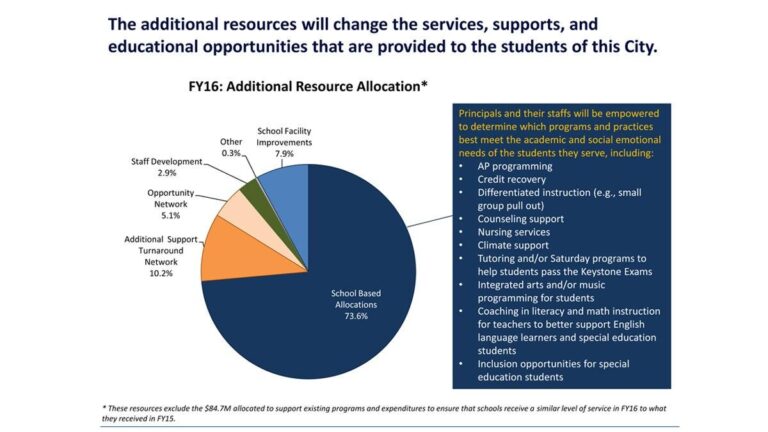Philadelphia Public Schools Confront Major Budget Deficit Amid Federal Funding Freeze
Philadelphia’s public education system is on the brink of a severe financial crisis following the Trump administration’s decision to suspend the release of vital federal education funds. These withheld funds, totaling tens of millions of dollars, were designated to assist economically disadvantaged students and bolster special education programs during the current fiscal year. District officials warn that this interruption will deepen existing budgetary strains, potentially forcing reductions in key programs, staff layoffs, and postponement of necessary facility upgrades.
District leaders have pinpointed several critical areas at risk, including:
- Support services for students with disabilities
- After-school enrichment and summer learning initiatives
- Investment in classroom technology and educational materials
| Funding Category | Amount Frozen | Primary Use |
|---|---|---|
| Title I Grants | $12 million | Assistance for low-income students |
| IDEA Funding | $8 million | Special education support |
| Technology Investments | $3 million | Upgrading classroom technology |
Student Services and Educator Resources at Risk Amid Funding Cuts
The suspension of federal funding jeopardizes essential programs that serve Philadelphia‚Äôs most at-risk student populations. There is growing apprehension that cuts to after-school programs, special education, and mental health services‚ÄĒalready critical during the ongoing pandemic recovery‚ÄĒwill widen achievement disparities and limit equitable access to quality education.
Financial constraints may also lead to staff reductions, with districts preparing for difficult personnel decisions. Potential consequences include:
- Fewer counselors available, negatively affecting student mental health support
- Reduced classroom aides, limiting personalized instruction
- Cutbacks in professional development, potentially diminishing teaching effectiveness
A recent district analysis projects the following impacts:
| Program Area | Projected Funding Loss | Staffing Impact |
|---|---|---|
| Special Education | $3 million | Reduction of 20 aides |
| After-School Programs | $2 million | Elimination of 15 coordinators |
| Mental Health Services | $1.5 million | Loss of 10 counselors |
Community and Legal Resistance Grows Against Federal Funding Withdrawal
The decision to withhold federal funds has sparked strong backlash from educators, local officials, and advocacy organizations who warn that the funding gap threatens the stability of Philadelphia’s educational system. Legal analysts predict that this action could trigger lawsuits, with districts arguing that the federal government is breaching contractual and statutory obligations. Community advocates emphasize that the funding freeze endangers vital programs such as special education, literacy support, and school meal services.
Public response has been robust and diverse, including:
- Demonstrations: Organized gatherings at municipal buildings and school board sessions to raise awareness.
- Petition Drives: Thousands of signatures collected demanding restoration of funds.
- Legislative Engagement: Collaboration with state lawmakers to identify alternative funding avenues.
| Group | Actions Undertaken | Expected Outcomes |
|---|---|---|
| Teachers’ Union | Legal challenges and public awareness campaigns | Safeguard educator jobs and classroom resources |
| Parent Organizations | Petitions and community forums | Protect programs for students with special needs |
| City Leadership | Negotiations and lobbying efforts | Restore federal funding or secure local alternatives |
Local Government Strategies to Address Budget Deficits
In response to the unexpected federal funding freeze, local authorities are exploring strategic measures to preserve essential educational services. A key tactic involves categorizing expenditures into essential, flexible, and postponable to prioritize spending on core programs while deferring less critical expenses. Strengthening partnerships with nonprofits and local businesses is also being pursued to supplement funding through donations and in-kind contributions.
Additional cost-saving initiatives under consideration include:
- Implementing energy-saving upgrades in school facilities to lower utility costs
- Forming shared service agreements with neighboring districts to optimize resource use
- Introducing voluntary furloughs or reduced work hours as temporary payroll management strategies
The table below compares these approaches based on their financial and operational impacts:
| Approach | Estimated Budget Savings | Effect on Services |
|---|---|---|
| Spending Prioritization | High | Minimal disruption |
| Energy Efficiency | Moderate | None |
| Shared Services | Moderate | Some adjustments required |
| Staff Furloughs | Variable | Moderate disruption |
Conclusion: Education Funding Uncertainty and the Road Ahead
As the dispute over federal education funding persists, Philadelphia’s public schools face an uncertain financial future with potentially profound consequences. Educators and administrators caution that the loss of millions in federal aid threatens to dismantle critical programs serving thousands of students. This funding impasse highlights the complex political dynamics surrounding education finance and raises urgent questions about how school districts nationwide will adapt to similar fiscal challenges. Stakeholders in Philadelphia and across the country remain vigilant, hoping for a resolution that restores essential support to public education.








